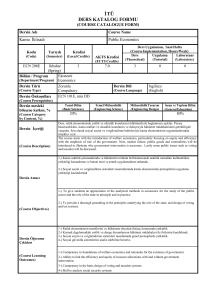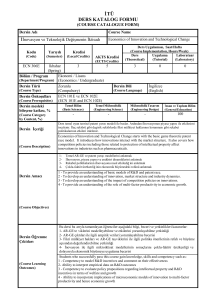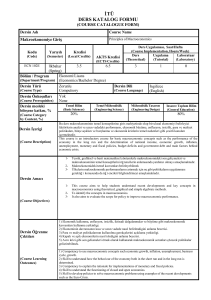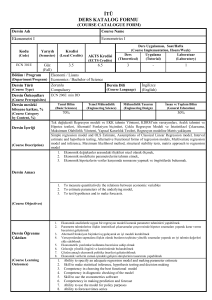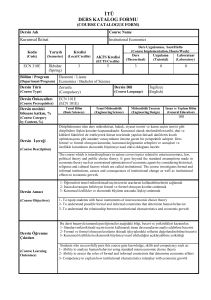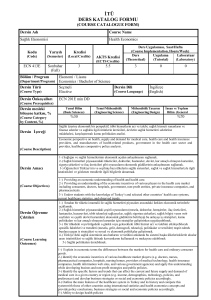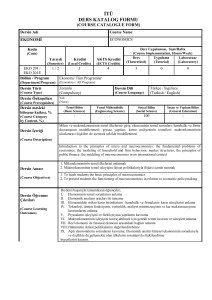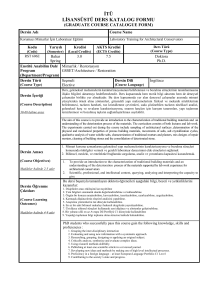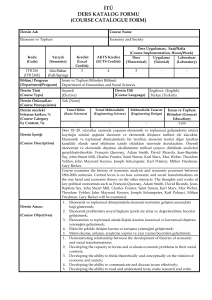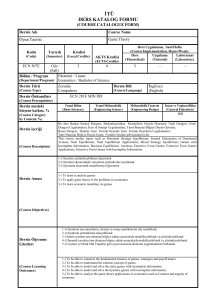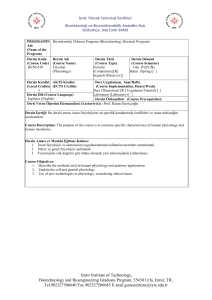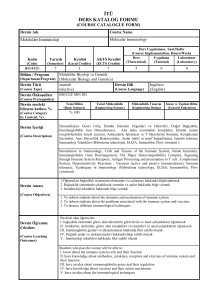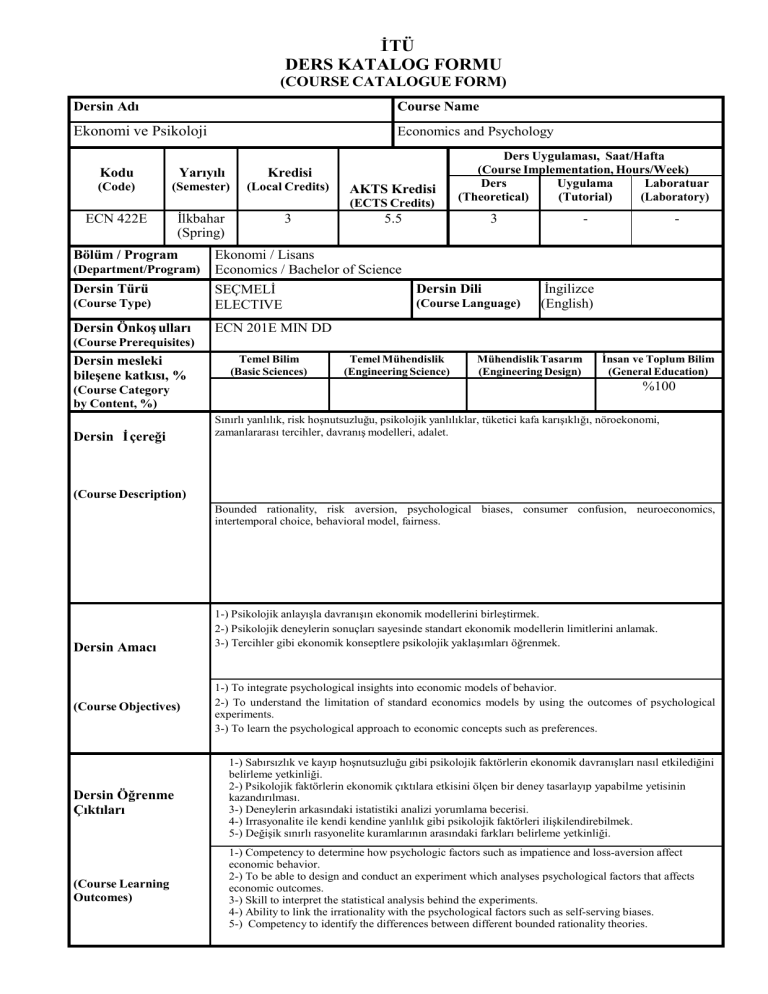
İTÜ
DERS KATALOG FORMU
(COURSE CATALOGUE FORM)
Dersin Adı
Course Name
Ekonomi ve Psikoloji
Economics and Psychology
Kodu
Yarıyılı
Kredisi
(Code)
(Semester)
(Local Credits)
AKTS Kredisi
(ECTS Credits)
ECN 422E
İlkbahar
(Spring)
Bölüm / Program
(Department/Program)
Dersin Türü
3
Ders Uygulaması, Saat/Hafta
(Course Implementation, Hours/Week)
Ders
Uygulama
Laboratuar
(Theoretical)
(Tutorial)
(Laboratory)
5.5
3
-
-
Ekonomi / Lisans
Economics / Bachelor of Science
(Course Type)
SEÇMELİ
ELECTIVE
Dersin Önkoş ulları
ECN 201E MIN DD
Dersin Dili
(Course Language)
İngilizce
(English)
(Course Prerequisites)
Dersin mesleki
bileşene katkısı, %
(Course Category
by Content, %)
Dersin İ çereği
Temel Bilim
(Basic Sciences)
Temel Mühendislik
(Engineering Science)
Mühendislik Tasarım
(Engineering Design)
İnsan ve Toplum Bilim
(General Education)
%100
Sınırlı yanlılık, risk hoşnutsuzluğu, psikolojik yanlılıklar, tüketici kafa karışıklığı, nöroekonomi,
zamanlararası tercihler, davranış modelleri, adalet.
(Course Description)
Bounded rationality, risk aversion, psychological biases, consumer confusion, neuroeconomics,
intertemporal choice, behavioral model, fairness.
Dersin Amacı
(Course Objectives)
1-) Psikolojik anlayışla davranışın ekonomik modellerini birleştirmek.
2-) Psikolojik deneylerin sonuçları sayesinde standart ekonomik modellerin limitlerini anlamak.
3-) Tercihler gibi ekonomik konseptlere psikolojik yaklaşımları öğrenmek.
1-) To integrate psychological insights into economic models of behavior.
2-) To understand the limitation of standard economics models by using the outcomes of psychological
experiments.
3-) To learn the psychological approach to economic concepts such as preferences.
Dersin Öğrenme
Çıktıları
1-) Sabırsızlık ve kayıp hoşnutsuzluğu gibi psikolojik faktörlerin ekonomik davranışları nasıl etkilediğini
belirleme yetkinliği.
2-) Psikolojik faktörlerin ekonomik çıktılara etkisini ölçen bir deney tasarlayıp yapabilme yetisinin
kazandırılması.
3-) Deneylerin arkasındaki istatistiki analizi yorumlama becerisi.
4-) Irrasyonalite ile kendi kendine yanlılık gibi psikolojik faktörleri ilişkilendirebilmek.
5-) Değişik sınırlı rasyonelite kuramlarının arasındaki farkları belirleme yetkinliği.
(Course Learning
Outcomes)
1-) Competency to determine how psychologic factors such as impatience and loss-aversion affect
economic behavior.
2-) To be able to design and conduct an experiment which analyses psychological factors that affects
economic outcomes.
3-) Skill to interpret the statistical analysis behind the experiments.
4-) Ability to link the irrationality with the psychological factors such as self-serving biases.
5-) Competency to identify the differences between different bounded rationality theories.
Ders Kitabı
(Textbook)
Diğer Kaynaklar
Shleifer, Andrei. Inefficient Capital Markets: An Introduction to Behavioral Finance.
Oxford UP, 2000.
(Other References)
Thaler, Richard. The Winner's Curse: Paradoxes and Anomalies of Economic Life.
Princeton, N. J.: Princeton University Press, 1994.
Ödevler ve Projeler
YOK
(Homework & Projects)
NONE
Laboratuar Uygulamaları
YOK
(Laboratory Work)
NONE
Bilgisayar Kullanımı
YOK
(Computer Use)
NONE
Diğer Uygulamalar
YOK
(Other Activities)
NONE
Baş arı
Değerlendirme
Sistemi
Faaliyetler
(Activities)
Yıl içi Sınavları
(Midterm Exams)
Kısa Sınavlar
(Quizzes)
Ödevler
(Homework)
Projeler
(Projects)
Dönem Ödevi/Projesi
(Term Paper/Project)
Laboratuar Uygulaması
(Laboratory Work)
Diğer Uygulamalar
(Other Activities)
Final Sınavı
(Final Exam)
(Assessment Criteria)
Adedi
(Quantity)
1
Değerlendirmedeki Katkısı, %
(Effects on Grading, %)
30
2
20
1
50
DERS PLANI
Hafta
1
2
3
4
5
6
7
8
9
10
11
12
13
14
Konular
Ekonomide Psikolojik varsayımların rolü
Yanlılık
Risk Sevmemek ve Prospect Teorisi
Sınırlı Rasyonalite ve Öğrenme
Karar Hazzı ve Beklenti Hazzı
Aşırı Güven – Teori
Aşırı Güven - Uygulama
Zaman İskontosu and Kendini Kontrol
Davranışsal Ekonomi ve Ebeveyncilik
Adalet
Nöroekonomi
Davranışsal Finans
Deneysel Finans
Balonlar ve Çöküş
Dersin
Çıktıları
1
1,2,3
1,2,3
1,2,5
4
2,4,5
2,4,5
5
1
1
1
2,3
2,3
2,3
COURSE PLAN
Weeks
1
2
3
4
5
6
7
8
9
10
11
12
13
14
Topics
Role of Psychological assumptions in economics
Heuristics and Biases
Risk Aversion and Prospect Theory
Bounded Rationality and Learning
Decision Utility and Expected Utility
Overconfidence - Theory
Overconfidence - Application
Time Discounting and Self Control
Behavioral Economics and Paternalism
Fairness
Neuroeconomics
Behavioral Finance
Experimental Finance
Bubbles and Crashes
Course
Outcomes
1
1,2,3
1,2,3
1,2,5
4
2,4,5
2,4,5
5
1
1
1
2,3
2,3
2,3
Dersin Ekonomi Lisans Programıyla İlişkisi
Programın mezuna kazandıracağı bilgi ve beceriler (programa ait çıktılar)
a
b
c
d
e
f
g
h
Katkı
Seviyesi
1 2 3
Ekonomik ve sosyal problemleri, temsili aktörlerin amaç fonksiyonlarını bir takım kısıtlara tabi
olarak maksimize ettikleri ve buna bağ lı olarak çeşitli tarz dengelerin oluşturduğu ortamlar
şeklinde matematiksel olarak modelleyen iktisadi yaklaşımda yetkinlik.
Mikroiktisadi fiyat sistemini özel ve kamu malları ve uluslar arası ticaret bağ lamında öğrenip iş
stratejileri ve kamu politikaları tasarımında etkinlik ve eşitlik dengesini gözeterek hukuk
çerçevesinde kullanabilme yetkinliği. Bulguları Türkçe veya İngilizce olarak ifade edebilmek.
Fiyatların genel düzeyi, işsizlik ve çıktı düzeyine iliş kin temel makroekonomik modelleri inşa
edebilme kabiliyeti. Bulguları Türkçe veya İngilizce olarak ifade edebilme becerisi.
Ekonomik büyüme ve teknolojik geliş menin belirleyenlerini, sosyal fayda ve sosyal maliyetlerini
değ erlendirebilme kabiliyeti.
statistiki ve ekonometrik modelleme ve yöntemleri iktisadi ve sosyal verilerin bilgisayar
ortamında analiz edilmesinde ve yorumlanmasında temel düzeyde kullanabilme yetkinliğ i.
Bulguları Türkçe veya İngilizce olarak ifade edebilme becerisi.
Bir sektörün ekonomisinde uzmanlık geliştirme kabiliyeti. Yerli veya yabancı bir ülkedeki bir
sektörde uzmanlık.
Karar verme alanındaki standart iktisadi modellerde ve karar vermeye iliskin alternatif
varsayımlarda yetkinlik.
Yurt içinde veya dısındaki ekonomik kurumlar ve düzenlemeleri, tarihi, hukuki ve sosyal altyapıyı
dikkate alarak analiz etme yetkinligi. Bu tür bir analizi sektörel uzmanlıkla birlestirme becerisi
X
X
1: Az, 2. Kısmi, 3. Tam
Relationship of the course with the Bachelor of Science Program in Economics
The Knowledge, Skills and Competencies that Students will Gain from the Program
(Program Outputs)
a
b
c
d
e
f
g
h
Level of
Contribution
1
2
3
Competency in the fundamental economic approach that models economic and social problems
mathematically as environments with various types of equilibria where representative agents
maximize their objective functions subject to a set of constraints.
Competency in the microeconomic price system in the context of private and public goods and
international trade, and the ability to design business strategies and public policies considering
efficiency-equity balance and the legal framework. Skill to express findings in Turkish or
English.
Ability to construct basic macroeconomic models regarding the general price level,
unemployment, and output. Skill to express findings in Turkish or English.
Ability to assess the social benefits, costs, and determinants of economic growth and
technological advancement.
Competency in statistical and econometric modeling and methods to analyze and interpret at a
basic level economic and social data in a computerized environment. Skill to express findings
in Turkish or English.
Ability to develop expertise in the economics of a sector. Specialty in a domestic or foreign
sector.
Competency in economic models of decision making and in alternative assumptions related to
decision-making.
Competency to analyze domestic or foreign economic institutions and regulations considering
the historical, legal, and social infrastructure. The skill to combine such an analysis with
sectoral expertise.
1: Little, 2. Partial, 3. Full
Düzenleyen (Prepared by)
Tarih (Date)
21.05.2014
İmza (Signature)
X
X

